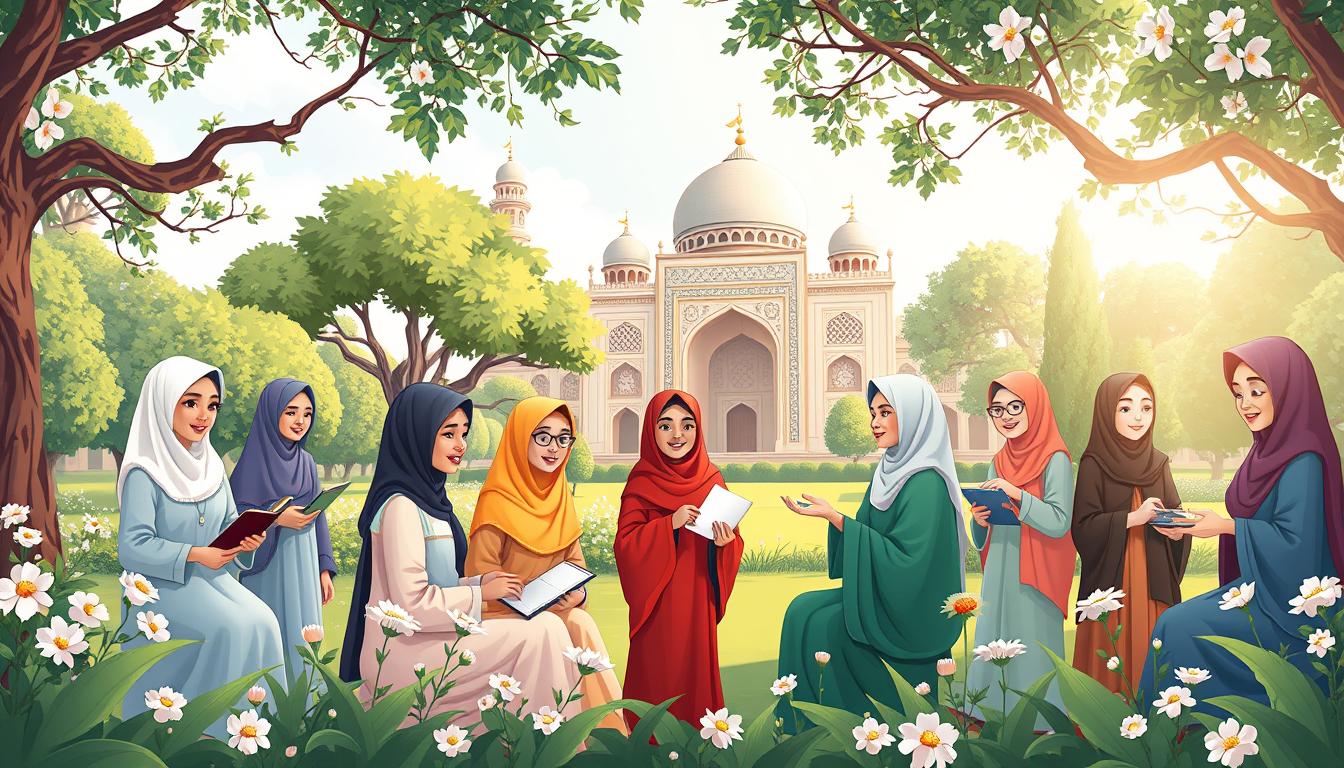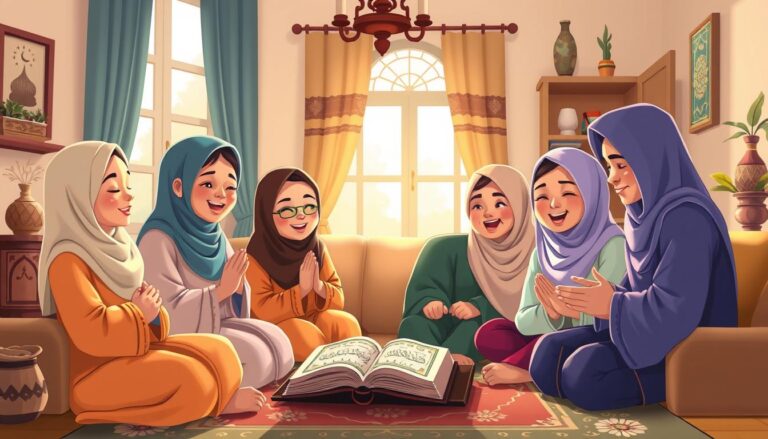Islamic Teachings on Women’s Equality: What You Need to Know
Is Islam truly a religion of gender equality? This question has sparked debates and misconceptions for centuries. The status of women’s rights in Islam and gender equality in Islamic teachings often face scrutiny in today’s world. Let’s dive into what the faith actually says about Muslim women’s status and uncover the truth behind these complex issues.
Islam emphasizes spiritual equality between men and women, challenging many preconceived notions. The Qur’an states that both genders are created from a single soul, highlighting their equal spiritual nature. This foundational principle shapes Islamic views on women’s rights and their role in society.
While acknowledging biological differences, Islam assigns specific strengths to each gender. For instance, men are tasked with financial responsibilities, while women are given primary care for young children. These differences don’t imply inequality but rather complementary roles within the family and society.
Islamic inheritance laws offer a nuanced perspective on gender equality. Contrary to popular belief, women inherit more than men in 16 instances and equally in 10 cases. The instances where men inherit more are balanced by their greater financial obligations in Islamic teachings.
Key Takeaways
- Islam emphasizes spiritual equality between men and women
- Biological differences are acknowledged, with complementary roles assigned
- Women have financial independence and property rights in Islam
- Inheritance laws are more complex than commonly perceived
- Islam condemns practices like honor killings
- Women’s testimony is respected in Islamic tradition
- Hijab is considered mandatory for practicing Muslim women
Understanding Gender Equality in Islam
Gender equality in Islam is more than just comparing things. The Quran shows a deep view of equality, focusing on spiritual value and moral duty. It doesn’t aim for complete sameness.
Defining Equality from an Islamic Perspective
Islamic feminism says men and women are spiritually equal. The Fifth Caliph, His Holiness Hazrat Mirza Masroor Ahmad, points out that Allah created them equally. This shows the basic equality between genders.
The Qur’anic Principle of Human Equality
The Quran clearly teaches human equality, no matter the gender. This is seen in many areas of life, including:
- Full property rights for women before and after marriage
- The right for married women to keep their maiden name
- Financial security and support for women all their lives
Misconceptions about Gender Roles in Islam
Many wrong ideas about gender roles in Islam come from culture, not the Quran. The Quran gives different roles to men and women, like mothers caring for babies and men protecting them. These roles don’t mean one is better than the other. They show how men and women work together in society.
“Allah made men and women in the same way, emphasizing equality between the genders.” – His Holiness Hazrat Mirza Masroor Ahmad
To truly understand gender equality in Islam, we must look deeper. We need to explore the spiritual and practical sides of equality as the Quran and Islamic law teach.
The Spiritual Aspect of Gender Equality
Islam values the spiritual equality of men and women. The Qur’an says both genders have equal human dignity and spiritual potential. This belief is key to Islamic gender justice and shapes how Muslim women are viewed in society.
Equal Spiritual Nature
The Qur’an teaches that men and women are spiritually equal. Both receive the “divine breath” and can reach spiritual excellence. This idea is shown in verse 16:97 of the Qur’an:
“Anyone who works righteousness, male or female, while believing, we will surely grant them a happy life in this world, and we will surely pay them their full recompense for their righteous works.”
Divine Creation and Human Dignity
Islam believes Allah created men and women with equal dignity. This belief opposed old practices that undervalued women, like burying infant girls alive. The Qur’an changed women’s rights, highlighting their inherent worth and dignity.
Equality in Religious Duties and Rewards
In Islam, men and women have the same religious duties and rewards. The Qur’an says in verse 33:35:
“The submitting men, the submitting women, the believing men, the believing women… God has prepared for them forgiveness and a great recompense.”
This verse shows that spiritual accountability and rewards are not based on gender. They depend on faith and actions. These teachings are at the heart of Islamic gender justice, promoting equality in the spiritual realm and affecting Muslim women’s status.
Women’s Rights in Islamic Jurisprudence
Islamic law on women’s rights is a topic of much debate. The Quran supports gender equality, but interpretations differ. This has led to varied practices in Muslim-majority countries.
- Employment rights
- Inheritance laws
- Marriage age restrictions
- Dress codes (such as hijab requirements)
Despite challenges, efforts to empower women in Islam are ongoing. Almost all Muslim-majority countries have agreed to advance women’s rights. They have signed the Convention for the Elimination of All Forms of Discrimination against Women (CEDAW).
“At least one in three women worldwide is subjected to violence at some point in her lifetime.” – UN Secretary-General’s 2006 report
Programs like “Women’s Empowerment in Muslim Contexts” (WEMC) work to uphold women’s rights. They aim to blend traditional values with modern gender equality. This helps the needs of about 600 million Muslim women worldwide.
As discussions on Islamic law continue, many scholars are reevaluating old interpretations. They want to make sure women’s rights match Islamic values of justice and equality.
The Economic Rights of Women in Islam
Islam gives Muslim women important economic rights, fighting against old ideas of gender inequality. A 2017 study from the University of Kashmir shows how women’s status changed with Islam.
Property Rights in Marriage
Islamic law lets women own property, no matter if they’re married or not. This includes money, land, and other things. Unlike before Islam, women now have financial freedom.
Financial Security and Support
In Islam, men must help financially with their wives and kids. This is different from before Islam, when women had no financial help. The Quran talks about respect and fairness in earning and spending.
Islamic Inheritance Laws
Islamic inheritance laws are a big step forward for women’s rights. Before Islam, women got no inheritance in Arabia. Islam made laws that give women a share, but it depends on their family role.
“Islam emphasizes the equality between men and women, presenting their roles as complementary.”
Even with challenges in some Muslim countries, Islam sets a good example for women’s economic rights. The difference between these teachings and today’s practices shows we need to keep working. We must make sure women’s economic rights are fully respected in Muslim societies.
Social Status of Women in Islamic Teachings
Islamic teachings greatly improve the social status of women. The Quran says women have the same rights and duties as men. This is a big change from many other cultures.
In ancient Greece, women were seen as minors, always under a man’s control. Roman law made women property, giving husbands full control over their assets.
Islam brought big changes for women’s roles. The Quran says men and women are equal in doing good deeds and getting rewards. It also says both are created from the same soul, showing women’s importance in society.
This view is very different from earlier times when women had little freedom or rights.
Islamic teachings also stress the respect for women in different roles:
- As daughters deserving love and care
- As wives entitled to kind treatment
- As mothers worthy of the highest honor
Prophet Muhammad taught to treat women with kindness. He raised their status in 7th-century Arabia. This positive view of women’s roles in Islam still affects Muslim communities today.
Now, we see more Muslim women in leadership roles. They are making important contributions in religious, academic, and political areas. They talk about gender issues and their place in Islam.
“The believers who show the most perfect faith are those who have the best character and the best of you are those who are best to their wives.” – Prophet Muhammad
Islamic Teachings on Women’s Equality: What You Need to Know
Islam teaches that men and women are equal in spirit and duty. The Quran and Hadith guide us on women’s rights and equality in Islam.
Core Principles of Gender Equality in Islam
Islamic teachings highlight the equal value of men and women. Both are encouraged to seek knowledge. Women have rights in Islam, including:
- The right to consent to or decline marriage proposals
- The ability to initiate divorce proceedings
- Inheritance rights for daughters, wives, mothers, and sisters
- Fair compensation for divorced women
Addressing Common Misconceptions
Many misunderstandings about women’s rights in Islam come from cultural practices, not religion. For example, some think wives must always obey their husbands. But this belief varies greatly across Muslim-majority countries.
In South Asia and Southeast Asia, nearly 90% of Muslims believe this. But in Southern and Eastern Europe, fewer than half do.
Practical Application in Modern Society
To apply Islamic gender equality today, we need to rethink old views. Muslim women often support women’s rights more than Muslim men. For example, in 12 out of 23 countries, women are more in favor of a woman’s right to wear a veil in public.
“Women in Islam are regarded as equals and are permitted to participate in political and leadership roles.”
History backs this up. Aisha, a wife of Prophet Muhammad, was a top scholar in Islamic history. Women like Khadija and Al-Shifa bint Abdullah also played key roles in early Islam. This shows women can lead, as Islamic teachings suggest.
The Role of Women in Islamic History
Women have played key roles in Islamic history. They made big contributions to religious studies, literature, and the arts. Their impact on Islamic civilization is deep, but often missed in history books.
Aisha, the wife of Prophet Muhammad, was a famous teacher and scholar. Her wisdom and knowledge helped shape early Islamic thought. Many women followed her example, becoming respected in their fields.
Women in Islamic civilization held important positions of power. For example, Benazir Bhutto became Pakistan’s Prime Minister, breaking barriers in politics. In the spiritual world, Rabia, an 8th-century woman, introduced Sufism, a mystical branch of Islam.
“Until 1882, women in England did not retain their property upon marriage while Muslim women always kept their own assets.”
This fact shows how progressive women’s rights were in early Islamic societies. Women kept their economic independence, a concept way ahead of its time. Today, Muslim women keep pushing for their rights in Islamic law.
- Women inherit property in Islam, though Sunni law grants them half of men’s share
- Monogamy is more common in Muslim marriages than often perceived
- The hijab and veiling practices vary across Muslim cultures
As we explore the rich history of women in Islamic civilization, it’s clear their contributions are worth more recognition. Muslim female scholars have shaped and continue to influence the Islamic world in deep ways.
Challenging Patriarchal Interpretations of Islamic Texts
Islamic feminism is changing how we see religious texts. It aims to fix gender issues in Muslim communities while keeping true to Islam.
Alternative Readings of Controversial Verses
Experts like Fatima Mernissi and Azizah Al-Hibri are changing how we view the Qur’an. They say many old views on gender come from culture, not God’s word.
Contextual Understanding of Qur’anic Teachings
Islamic feminism focuses on the time period of the Qur’an’s teachings. It shows the Qur’an gave women big rights over 1400 years ago. These include owning property, agreeing to marriage, and getting a divorce.
The Importance of Ijtihad in Gender Equality Discussions
Ijtihad, or thinking for oneself, is key in solving today’s gender issues in Islam. It lets scholars update old texts to support equality, keeping Islamic values in mind.
- The Qur’an confirms spiritual equality between men and women
- Early interpretations contributed to patriarchal systems
- Challenging these structures is seen as a religious duty
- Both men and women must work together for change
Looking at Islamic texts through a feminist lens is not about rejecting faith. It’s about bringing back Islam’s message of equality. This effort wants to make Muslim communities more welcoming, where women’s voices are respected and heard.
Women’s Education and Leadership in Islam
Islam values education for everyone, including women. It sees learning as a key religious duty. This has led to more focus on Muslim women’s education lately.
Yet, many Muslim countries struggle to give women equal education chances. Girls’ literacy and education levels are often lower than the world average. This shows the need for more work to help Muslim women get educated.
Women have always played important roles in Islam. Today, there’s a push to give them more leadership positions in Muslim societies.
“Seek knowledge from the cradle to the grave.” – Prophet Muhammad
In recent years, Muslim women have made strides in politics. This progress comes from more democracy and changing views on women’s roles. Education and human rights have also played a part.
Despite ongoing challenges, the push for Muslim women’s education and leadership is growing. This effort aims to achieve gender equality in Islamic communities. By working on these issues, Muslims can follow the Qur’an’s message of equality between men and women.
Balancing Traditional Values and Modern Gender Equality
Islamic modernism aims to mix old values with new ideas about gender equality. This mix is hard because communities face old customs and new social norms.
There are still big gaps in gender equality. For example, only 25% of professors are women. Also, many mosques in the UK don’t have places for women to pray. These facts show we need to work harder for gender equality.
The Quran says men and women are spiritually equal. It says being good, not your gender, matters to Allah. This idea is key for gender equality in Islam.
“The most noble of you in the sight of Allah is the most righteous of you.” – Quran 49:13
Muslim countries are trying to follow the Quran’s teachings on gender equality. But, they face big challenges from cultural traditions that don’t always match Islamic teachings. For instance, some places limit women’s rights even though Islam says they should have financial security and own property.
To solve these problems, we need to look at our cultural practices and challenge old views of religious texts. Progressive Muslim thinkers say following Islam truly means accepting gender equality in all parts of life.
Conclusion
Islamic teachings on women’s equality provide a strong foundation for gender justice. These teachings contrast sharply with the pre-Islamic era, where women were often marginalized. In ancient Arabia, women faced issues like infanticide, unfair inheritance, and being treated as property.
Islam introduced major changes, affirming women’s rights and dignity. The Prophet Muhammad ﷺ emphasized that men and women have equal spiritual standing. He encouraged women to fully participate in religious and social activities.
Islamic teachings also gave women the right to own property, represent themselves in court, and make financial decisions on their own. This was a groundbreaking step towards gender equality in a society dominated by men.
Even with these teachings, many Muslim-majority countries still face challenges today. Women in the Arab region often have higher poverty rates and lower job participation than men. The education gap is also significant, with about 65% of Muslim women being illiterate.
Improving these gaps could greatly benefit the economy. For example, Egypt’s GDP could increase by 34% if women’s education and employment were improved. It’s essential to continue promoting gender justice in Islam to empower women and boost economic growth.
By focusing on these teachings, Muslim societies can work towards a more just and balanced society. This will benefit everyone, not just women.
Source Links
- Gender Equality in Islam
- Women | Yaqeen Institute for Islamic Research
- Gender Equity in Islam
- Gender Equality in Islam
- Women in the Quran and the Sunnah
- Handout 3: Position – Muslim Women Are Not Equal
- Gender Roles in Islam: Equity or Equality?5 min read
- Islam and Women’s Rights | Overcoming Inequality | Center for Inquiry
- Women’s rights in Islam: Fighting for equality
- Promoting Gender Equality in Muslim Contexts – Women’s Voices Must Not Be Silenced | United Nations
- The Rights of Women in Islam and Some Misconceptions An Analysis from Bangladesh Perspective
- Economic Rights
- THE STATUS OF WOMAN IN ISLAM
- Women in Islam
- Status of Women in Islam — GainPeace
- Chapter 4: Women In Society
- The Rights of Women in Islam — A Complete Guide — The Muslim Network
- Five things you need to know about women in Islam: Implications for advancing women’s rights in the Middle East
- Global Connections . Roles of Women
- The Case Against Patriarchy in Islam: Fitra, viceregency, and universal principles – Islamic Networks Group (ING)
- Islam and Patriarchy – and why it’s important to understand
- Q’uran on Women’s Leadership | International Museum of Women
- “Islam and Educational Equality for Muslim Women”
- Equality in Quran – Women Development Organization
- Gender roles in Islam
- "We Used to Have No Regard for Women": Gender Equity & the Advent of Islam | Yaqeen Institute for Islamic Research
- The case for gender equality in the Muslim world







